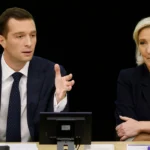From Monday 1st July, Viktor Orban’s Hungary will take over the leadership of the European Union. More precisely, the rotating presidency of the Council of the Union for six months. However, Budapest’s Euroscepticism is not likely to reassure its partners. Viktor Orban is a bit like the student at the back of the class who only does what he wants, tells the teacher to mind his own business and couldn’t care less about warnings.
The Hungarian head of government does not have the most constructive behaviour of the 27. From the independence of the judiciary to aid to Ukraine, including immigration and the rights of LGBT communities, the list of issues on which Hungary has strayed from European values is long, which has earned it unprecedented sanctions. Nineteen billion euros of funds owed to it are still blocked due to its breaches of the rule of law. If the country were a candidate for the European Union today, it is likely that the door would be slammed in its face.
Veto power and pro-Kremlin position
Viktor Orban also regularly tries to block the decisions of the 27. He sometimes uses his veto power or obstructs arbitrations for months. His pro-Kremlin position does not help. At the end of May, the Lithuanian Minister of Foreign Affairs was annoyed to see that “about 40% of the decisions of the 27 on Ukraine were blocked” because of the brakes of the ultraconservative leader. That said, things have changed a little, Hungary finally accepted, on Tuesday, the opening of accession negotiations with kyiv. A “historic moment” that will redraw the geopolitical map of the continent, but it has obtained the right not to supply weapons and continues to paralyze European military aid. The envelope of more than six and a half billion euros remains in a drawer for the moment.
For its presidency of the European Union, Hungary promises to play the game and to be “impartial”. Its slogan “Make Europe Great Again” is a perfect copy of the “Make America Great Again” (MAGA) formula of former US President Donald Trump, not exactly popular in Brussels. This is not insignificant, but its power to cause harm will a priori be minimal, because the next six months will be taken up by the distribution of posts and the appointment of the new Commission. Legislative activity will be relatively calm. Viktor Orban, like the Italian Giorgia Meloni, is nevertheless impatiently awaiting the outcome of the legislative elections in France. He hopes for an additional ally in his grand project of uniting the extreme right, intended to profoundly transform the European Union by giving back power to the nations.
This article is originally published on .francetvinfo.fr






